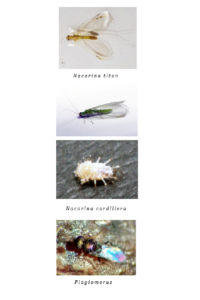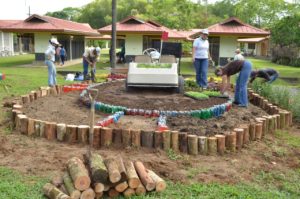Earth Day: University celebrates biodiversity’s important role in agriculture.
On International Mother Earth Day (April 22), the United Nations calls for everyone to “raise public awareness around the world to the challenges regarding the well-being of the planet and all the life it supports”.
At EARTH University, we celebrate the vital importance of biodiversity of plants, animals, microbes and more. We are committed, through the promotion and expansion of sustainable agriculture, to being stewards of biodiversity.
In addition to co-directing EARTH’s Center for Research and Development in Renewable Energies, professor Dr. Bert Kohlmann teaches Introduction to Natural Sciences, a required course for all first years. As a biologist specializing in entomology (the study of insects), populational genetics and ecosystems management, Professor Kohlmann has an abiding interest in biodiversity – a passion he formed long ago.
“I realized that we biologists were too entrenched in our own world of biology and viewed agriculture as an entirely artificial system, one far removed from what was considered a proper biological practice”, Kohlmann says. “I later understood agriculture to be an ecological system, which very few biologists had taken note of. It took me a couple of years, but eventually I was convinced that agriculture could be studied from a biological perspective, as part of an ecosystem”.
In the Q+A that follows, Professor Kohlmann explains the importance of biodiversity and EARTH’s actions to safeguard it through smarter agriculture.
Why is biodiversity important to agriculture?
It’s genetic variation. Through diversity, we have what’s necessary to adapt to different places, conditions and agronomical methods. Beyond that, it enables us to develop new crop varieties.
For example, in the face of climate change, biodiversity allows agriculture to adapt to the impending changes in temperature. Through its richness, we can start developing new ways to feed ourselves.
It’s important that all the world’s people have a nutritious diet, and this will depend on the variety of foods they are able to consume. Biodiversity facilitates not only food security but also health.
Consider the research of Juliet Daniela Araníbar (’18, Peru), whose Graduation Project involved the study of the banana pest known as “escama del banano”. While researching, she found three insects – all native to the area – that eat that pest. That’s an example of the use of biodiversity in crop control.

Nacarina titan, Nacarina cordillera and parasitoid wasps are some of the species employed as biological control agents against a major banana pest known as “escama del banano”.
How does EARTH help students shape themselves into stewards of biodiversity?
Today, agriculture faces the challenge of resolving its monoculture problem. We need to return to biologically sound methods that give diverse species – even ones formerly considered weeds – a chance to become nourishment.
Losing sight of biodiversity’s cruciality would be a grave error because our future lies with it. At EARTH, we encourage our students to research and work with various crops. We educate them to know that there’s no such thing as an unimportant species. In general, people tend to disregard the things they don’t understand, the small things, the things difficult to monetize. That’s an information and attitude problem we at EARTH strive to change.
How does EARTH practice biodiverse agriculture?
Since its founding, the University has encouraged students to understand and care for biodiversity. In classes, we cultivate sensitivity to the subject. And it’s not just talk; it’s a lot of action.

EARTH students learn biodiverse practices by working on various projects and in different settings.
Some examples of biodiversity-promoting practices that are undertaken on EARTH University’s academic farms include:
- We promote intelligent agriculture. Inputs are applied in exact quantities and at optimal times based on soil and climate analyses – thereby eliminating waste.
- We care for soil by growing the amount of organic matter on our farms. This practice facilitates the retention of nutrients and water, as well as erosion reduction.
- We take advantage of agricultural waste through composting and producing biogas (a renewable energy).
- We recreate complex agrosilvopastoral systems in which we mimic naturally occurring ecosystem processes.
- We develop organic agriculture projects in banana, cacao and pineapple that serve as examples for commercial producers.
- We advance biocontrol methods using native species and thereby improve production.
- We implement water- and soil-quality bioindicators, helping us to draw meaning from the presence of certain invertebrates.




